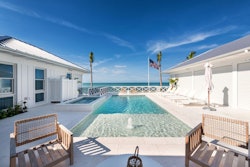With more efforts being made to go green, Stetson University in DeLand, Florida, is using native plants to reduce its ecological footprint. Efforts began in 2002 with the Native Plant Initiative when university President H. Douglas Lee implemented a policy of using Florida native plants in landscaping at Stetson. A major part of this policy was the creation of the Vera Lea Rinker Native Plant Garden.
The garden “is a significant resource for enhancing Stetson’s environmental studies facilities,” Lee says. “It serves environmental, educational and aesthetic roles and sends the message that Stetson University fosters landscape values based on access to a healthy and sustainable environment.”
Under Lee’s leadership, a team of faculty, staff and students was assembled. David Rigsby, Stetson University’s Department of Streets and Grounds manager, said that the team first had to define native plant and then create a native palette for the campus.
Construction of the garden was completed in August 2007, and was made possible through a donation from the Marshall and Vera Lea Rinker Foundation.
Stetson consulted with outside contractors and landscape architects on the design, assembly and irrigation of the 2.6-acre garden, which also serves as the private garden of the President’s house.
The garden is home to over 4,000 plants, trees and shrubs and is irrigated with reclaimed water. Native plants used in the garden include magnolia and Chickasaw plum trees and firebush, oakleaf hydrangea and Fakahatchee grass.
“It was tough finding some of the bigger tree material,” Rigsby says, “and it wasn’t a small undertaking to get them here.” Rigsby said that crews brought in 22-foot trees and 12-foot shrubs.
Now that the garden has been completed, other areas of campus are being replanted with native plants. “We have a 175-acre campus, and our commitment is anytime we replace plant material, we pull it from our native palette,” Rigsby says.
Maintenance for native plants is somewhat less intensive than with exotic plants, but there are challenges. The main difficulty with native plants is that some have already been domesticated. They are accustomed to receiving water and nutrients, where in a truly natural environment, they would not. Rigsby says watering is a balancing act as well because several native plants are deciduous.
Still, Rigsby believes using native plants is the right way to go in helping the environment. He advises those who want to be involved in a similar project to work with someone who has a knowledge of native plants. Despite the challenges, he has seen several benefits, many coming in the form of outreach programs.
Stetson has also been able to work with civic groups in the area, and the Garden Club of DeLand is sponsoring a home and garden tour of the Vera Lea Rinker Native Plant Garden to coincide with its dedication this month. The tour and dedication will take place on Saturday, April 19 from 10 a.m. to 4 p.m. and Sunday, April 20 from 1 p.m. to 4 p.m. TLC
~ Jennifer Mitchell
Letters to the editor
Dear Editor:
I read with interest your article on Snow’s Garden Center (January 2008). I am a contractor in the Utah area. The line that caught my interest was the statement about the H2B program. We used the program last year to great success, however, with Congress and their inability to pass legislation the cap was met well before our application was considered. I am wondering if Snow’s had similar success and if you know about other landscapers in the industry that are faced with this crisis that exists in our labor market. Any feedback that you have would be greatly appreciated. This is a tremendous program that our inept government system has once again fouled.
Brad J. Beus
Landscape Specialities
Ogden, Utah
Editor’s note: We asked Corbin Snow to respond to Brad’s query and he was kind enough to do so. His letter follows.
Dear Editor:
I would love to talk with Brad about the process. We are actually experiencing similar frustrations and problems this year. The Legislative bill S-988 is still held up in the House and nothing has been done to date to pass it. We were hoping to get it attached to (President) Bush’s economic stimulus package but nothing has happened yet. I believe it will be back on the House floor next week (week of February 4-8, 2008). Virginia Sen. John Warner is the co-author of the “Save the Small Business” and I spoke with his office yesterday. They thought it would be passed soon, it’s just taking longer than usual this year. The company we use to obtain the visas, IPR, has been really involved and instrumental throughout the entire process. As I receive more information I will update everyone. It’s really just the luck of the draw as far as having your visas processed in the first round.
Corbin Duane Snow
Snow’s Garden & Landscape Center
Charlottesville, Virginia
Other schools taking on eco-friendly projects
McNeese State University: Under the Louisiana Native Plant Initiative, students from McNeese are helping restore grasslands in southwest Louisiana. In order to restore the grasslands, McNeese and several other groups are working to produce native seed and plant materials to use in conservation projects.
Mississippi Gulf Coast Community College: Hurricane Katrina caused extensive damage to aquatic and wetland plant habitat on the Gulf Coast. A four-year program was proposed in 2007 called the Native Vegetation and Estuarine Plant Nursery Addition to Pascagoula River Basin Estuarine Education Center. Under Participants will work to develop a native plant nursery to be used for restoration and re-vegetation of the coast.
Saint Mary’s College of California: The Habitat Garden was built on campus to educate students and others about wildlife habitats. The garden demonstrates water conservation and reduction of urban runoff pollution, and it has also been planted with California native plants and non-native drought-tolerant plants. It also uses organic mulch rather than pesticides.
Louisiana State University: Students at LSU’s School of Architecture are being exposed to LEED certification. Fifth-year students take a course that, once completed, leads them to becoming LEED certified, while fourth-year students also design buildings to be energy-efficient.
Harvard University: Harvard has implemented the Harvard Green Campus Initiative to promote campus sustainability and use the campus as a learning laboratory. Over 20 buildings are LEED certified on the campus.
CLIPPINGS
Ronstar Flo herbicide registered in California
Bayer Environmental Science announces Ronstar Flo herbicide is now registered for use in California. A formulation of Ronstar herbicide, Ronstar Flo is a flowable product containing oxadiazon. Ronstar Flo is registered for use on dormant ornamentals and ground covers on residential and commercial properties. The new formulation can be applied to newly planted and established plants and works well on new, shallow-rooted landscape plantings.
Dow AgroSciences announces new rebate program
Dow AgroSciences has launched a new earning program for customers called The Power of MORE. Purchasers of Dow’s turf and ornamental herbicides, fungicides and insecticides are eligible for cash rebates on products bought between December 1, 2007, and May 31, 2008. To qualify, users must submit invoices and a claim form, and rebates will be mailed at the end of the program period. For more information, visit www.powerofmore.com.
Yanmar names new president and COO
Yanmar America appointed Thomas H. Calhoun to the position of president and chief operating officer for its North American operations. Calhoun joined Yanmar in 1999 as the director of marking for the Marine Engine Group, the Industrial Engine Division and the Replacement Parts Program. Calhoun succeeds Akihiko Nakaoka who will remain with Yanmar through 2008.
Register now for 2008 GIE+EXPO
Online registration is open for the 2008 Green Industry and Equipment Expo at www.gieexpo.com. This year’s tradeshow will be October 23-25 in Louisville, Kentucky. Features of the 2008 event include the three-day outdoor demonstration area, free concerts, the Dealer Club and the Green Industry Conference.
LebanonTurf appoints new marketing manager
LebanonTurf has named Mike Sisti their new marketing manager. Sisti brings 16 years of sales, marketing and management experience in the green industry. He holds a degree in communications from Susquehanna University, has taken classes in agronomy at Rutgers University and Penn State, and is working on a master’s degree at Rider University.
AuditorSoft announces its incorporation
AuditorSoft, located in Cupertino, California, is now a class C corporation. It provides Web-enabled water management and quality control to landscapers. In addition, AuditorSoft gained exclusive rights to ControllerSoft and QualitySoft, a Web-based software suite that helps clients reduce operational costs. The suite was formerly available through Green Leaf Mapping and Control Systems.
Dixie Chopper receives award for propane-powered mower
Dixie Chopper was honored for the development of the LP3000, a propane-powered mower. The Central Indiana Clean Cities Alliance (CICCA) presented Dixie Chopper with the 2008 CICCA Stakeholder Achievement Award during its annual meeting on Jan. 31.
Little Giant pond kits awarded at IA
Three visitors to the 28th Annual International Irrigation Show in San Diego, California, left the event proud owners of a Little Giant pond kit. Each 2,500-gallon kit included a liner, underlayment, pump, skimmer, pump skimmer discharge kit, PVC tubing, biological waterfall filter, LED light and transformer and additional LED light.Ronstar Flo herbicide
registered in California.






